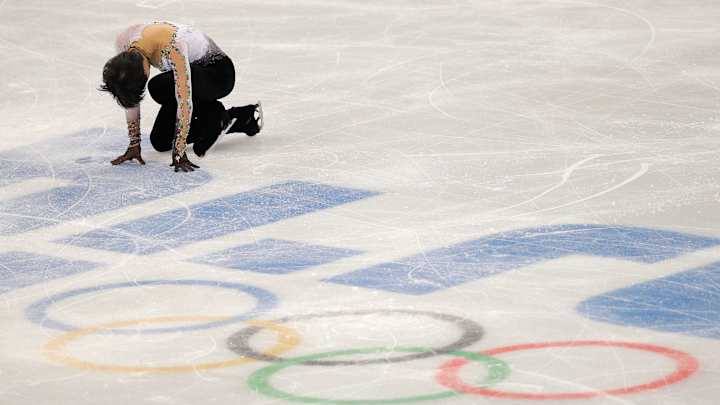Hanyu's historic gold for Japan no flash in pan

SOCHI, Russia (AP) Unlike when Chinese hurdler Liu Xiang made a major Olympic breakthrough for Asian men, Yuzuru Hanyu's historic gold medal for Japan in figure skating looks less a flash in the pan and more of a significant shift in his sport's center of gravity.
American coach Frank Carroll can still recall when Japan was sending experts abroad with notepads and movie cameras to try to work out why its skaters were far behind trailblazers from Europe and North America.
''They started way behind us to learn all this process, they learned how to skate years after us,'' said Carroll, whose many pupils over the years included Fumio Igarashi, a former Japan national champion who competed in the 1970s and 1980s.
''When we were way, way ahead of the game, they were just making movies, there weren't any videos then, it was movies, trying to study why somebody was better and what made them special and what the technique was.''
Now the tables are turning. After 19-year-old Hanyu became Asia's first male Olympic figure skating champion, Denis Ten got bronze for Kazakhstan. Two other Japanese skaters and China's 17-year-old Han Yan finished fifth, sixth and seventh.
Germany's skating team leader, Udo Doensdorf, said it was time to be studying what's happening in Japan.
In Japan, ''there is more money in figure skating than in any other country at the moment and that is a very important point,'' Doensdorf said. ''They can support the skaters with a lot of money and they can buy the best coaches, the best choreographers.''
At the summer games, Liu's gold in the 110-meter hurdles at Athens in 2004 remains the only victory for Asian men in an Olympic sprint event on the track. Japan's men did follow that with bronze in the 4x100-meter relay in 2008 and a fifth place in 2012. But no Asian man has qualified individually for an Olympic sprint final since Liu.
Given his young age and superior skating, it isn't fanciful to think that this could be only the first Olympic medal for Hanyu, not his last.
Shinzo Abe might want to think about putting the teenager on speed dial. The Japanese prime minister called Hanyu, Japan's first gold medalist of the Sochi Games, on Saturday morning in a conversation conducted over speakerphone for a room full of journalists.
After an exchange of niceties - ''great job,'' said Abe; ''I thought I had let the medal slip away,'' said Hanyu - the Japanese political leader noted that the young figure skater ''lived in an evacuation center'' after his city, Sendai, was hit by the devastating 2011 earthquake and tsunami. Hanyu fled his practice arena still wearing his skates for fear the building would not withstand the 9.0-magnitude quake.
''Your win will give inspiration to people in the disaster zone,'' Abe said.
Hanyu said he skating with the people of Sendai in mind.
''Yes, I hope I was able to uplift their spirits,'' he said. ''I couldn't use the rink after the disaster and got a lot of support from the people up there, so I was glad I could deliver this result to them.''
Hanyu and his coach, Brian Orser, said fierce competition in the Japanese national championships - itself a measure of the depth of skating talent in Japan - helped steel him for the pressure-cooker of the Olympics.
''There's a great group of skaters coming through that system,'' Orser said. The Japanese nationals ''are just as intense as this and that is why Yuzuru is a better skater, because he has to be better at home.''
Kathy Johnson, the coach of silver medalist Patrick Chan, noted a changing demographic among fans and the impact that was having on the development of the sport.
''If you go to skating competitions around the world, the majority of the audience is Japanese, anywhere in the world,'' she said, adding that the intense interest ''breeds good training programs.''
''That trend has been going for a while. You go to shows or even competitions in Asia, the house is packed. And you come to North America, and they are hard-pressed to fill the seats.''
Jason Dungjen, coach of U.S. champion Jeremy Abbott, said success comes in cycles. Figure skating is now most popular in Japan, South Korea and Russia ''and if you look at who has made a significant jump in the last few years, it's those countries.''
''So it is tied in that sense to an economic base because the more people are interested, the more money there is,'' Dungjen said. ''It started in Europe, then it was North America and then now it has shifted to Asia. What it does, I think, is put incentive on the other regions to catch back up.''
---
AP Sports Writer Jim Armstrong in Tokyo and SNTV video journalist Steve Moore in Sochi contributed.
